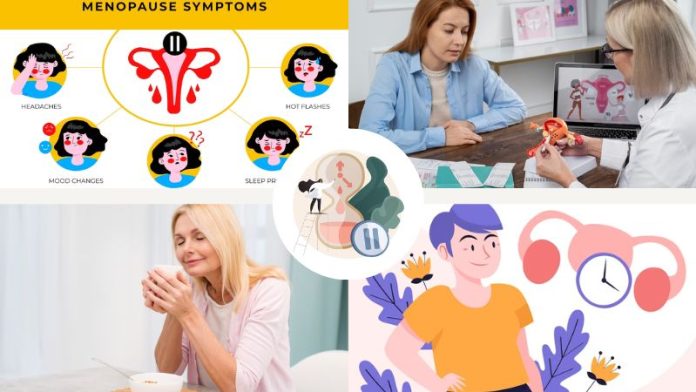
Menopause is a natural decrease in reproductive hormones when a woman reaches her late 40s or early 50s; in other words, it marks the end of women’s reproductive years. Every woman experiences menopause, typically in their late 40s and early 50s, although the exact timing can vary from person to person. Menopause is indicated by the absence of menstrual periods for one year, marking an end to a natural phase in a woman’s life. During menopause, a woman’s ovaries gradually produce fewer hormones, specifically estrogen and progesterone, which regulate the menstrual cycle and play a crucial role in various bodily functions. As hormone levels decline, women may experience multiple physical and emotional symptoms, including obesity, heart problems, osteoporosis, diabetes, hot flashes, sleep disturbances, headaches, mood fluctuations, vaginal discomfort, restlessness, body aches, and memory issues. Today, we will discuss the symptoms of menopause and about 7 natural menopause treatments that really work.
Physical and Emotional Symptoms of Menopause
Menopause has many physical and emotional symptoms, varying in intensity and duration from woman to woman. Some of the most common symptoms of menopause include:
Irregular Periods

The first signs of menopause are often irregular menstrual cycles. Women going through menopause may experience skipped periods, changes in menstruation duration, and heavier or lighter periods.
Hot Flashes

One of the most familiar symptoms of menopause is hot flashes. Women may experience sudden, intense feelings of heat, which can cause flushing, sweating, and a rapid heartbeat.
Night Sweats

Similar to hot flashes, night sweats occur during sleep, leading to extreme sweating and potential sleep disorders.
Vaginal Dryness

Vaginal dryness is discomfort due to reduced moisture in the vaginal area, often linked to hormonal changes. Decreased estrogen levels can lead to itching, vaginal dryness, and pain during sexual intercourse.
Mood Swings

Mood swings are steep and intense changes in emotional states, often influenced by hormonal fluctuations, stress, or psychological factors. During menopause, hormonal changes can affect mood and emotional well-being, causing mood swings, irritability, sadness, or anxiety.
Sleep Disturbances

Menopause often disrupts sleep due to hormonal shifts, night sweats, hot flashes, and mood changes, affecting overall sleep quality. Some women may experience insomnia or other sleep problems during menopause.
Changes in Libido

Menopause can impact libido. Hormonal changes can affect sexual desire, leading to a decrease in libido for some women, but this effect is not constant and varies among individuals. Apart from menopause, libido can be influenced by medical conditions, hormone levels, medications, lifestyle factors, and relationship issues.
Fatigue

Many women experience increased fatigue and a reduced overall sense of well-being during menopause. They encounter tiredness due to hormonal changes, sleep disturbances, and mood swings, affecting their overall energy levels and well-being.
Weight Gain

Some women may experience weight gain or changes in the body during menopause. Changes in metabolism and hormonal fluctuations can lead to weight gain, especially around the abdominal area.
Bone Density Loss
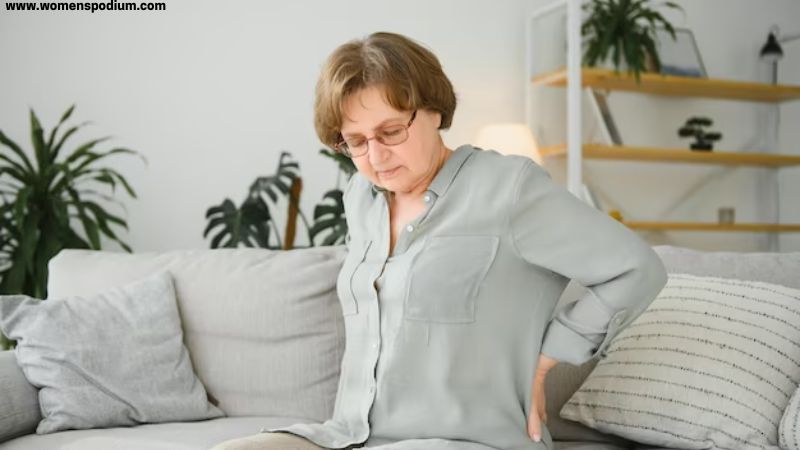
Estrogen helps maintain bone density, and its decline during menopause can augment the risk of bone health. Decreased estrogen levels can cause loss of bone density, potentially increasing the threat of osteoporosis and fractures.
Joint Pain
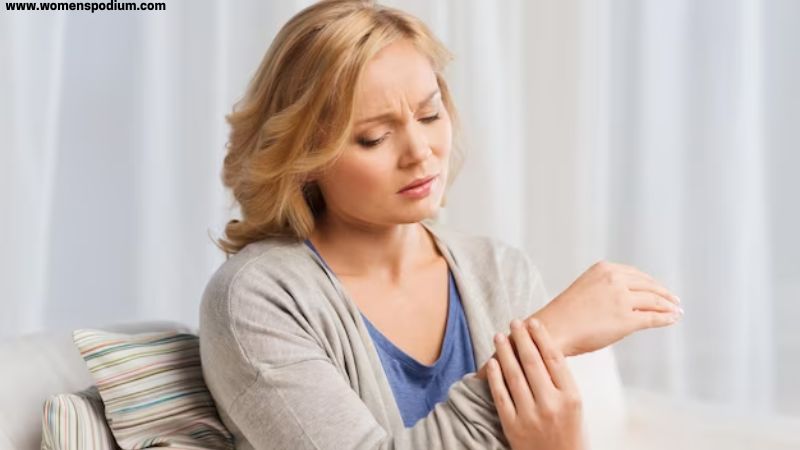
Joint pain during menopause can occur due to hormonal changes affecting connective tissues. Reduced estrogen levels may lead to stiffness, inflammation, and increased susceptibility to conditions like osteoarthritis, causing discomfort and reduced mobility.
Hair and Skin Changes

During menopause, some women witness changes in their hair texture or thinning and skin changes. Hormonal changes during menopause can lead to hair thinning, reduced hair volume, and changes in texture. Additionally, declining estrogen levels may reduce skin elasticity and moisture, contributing to dryness, fine lines, and wrinkles.
Memory and Concentration

Some women report memory problems and difficulties with concentration during menopause. Menopause can impact memory and concentration. Hormonal fluctuations may lead to cognitive changes like forgetfulness and difficulty focusing, commonly referred to as “brain fog,” affecting daily tasks and overall cognitive function.
7 Natural Menopause Treatments That Really Work
For women aged 45 to 55, managing this transitional phase effectively is crucial to safeguard their overall health and well-being. Here are some tips to help navigate this period and reduce the risk of further health complications. Natural menopause treatments can be effective in managing the symptoms associated with menopause for many women. While the effectiveness of these treatments may vary from person to person, here are 7 natural menopause treatments that really work, the natural approaches, that have been found to help alleviate menopause symptoms:
1. Eat Healthy

A well-balanced diet rich in fruits, vegetables, whole grains, lean proteins, and healthy fats can sustain overall health during menopause. Bring healthy changes in your lifestyle with your diet. Make sure to eat all your meals; try taking your meals in small portions. Eat food which is rich in protein, vitamins and calcium. Use fruits and vegetables in your meals as much as you can. Don’t miss dairy products; they must be on your daily food menu. Moreover, eating foods rich in Phytoestrogens, such as flaxseeds, soy, and whole grains, may help mimic the effects of estrogen in the body and alleviate some symptoms. Always prefer a balanced diet to fight menopause symptoms actively.
Limit the use of spices in your meals, steer clear of alcohol, caffeine, and junk food, and eliminate fatty and oily dishes from your diet. Avoiding triggers such as caffeine, alcohol, spicy foods, and nicotine can be beneficial in reducing both the frequency and intensity of hot flashes and night sweats.
2. Regular Exercise

Engaging in regular physical activity can help you manage weight, reduce the risk of bone loss, and enhance mood and overall well-being. Activities like walking, swimming, power yoga, and strength training can be beneficial. Exercise and physical activity are essential for a healthy and strong body and mind. It helps you maintain your weight to avoid obesity and other menopause symptoms. Benefits of exercise include fast metabolism and improved energy, healthier joints and bones, reduced stress and sound sleep. As we know, exercise helps in weight loss; achieving and maintaining a healthy weight may help alleviate menopause symptoms and help prevent disease.
3. Stay Hydrated

Staying adequately hydrated is essential during menopause, be it water, juices or healthier drink choices. Water and juices are crucial during menopause as they help relieve common symptoms like hot flashes and mood swings by keeping hydration and regulating body temperature. Adequate hydration also supports bone health and reduces the risk of urinary tract infections, which are more prevalent in menopausal women. Additionally, juices can provide vital nutrients and antioxidants that aid in hormonal balance and overall well-being during this transitional phase.
4. Adequate Sleep

Hormonal changes during menopause often lead to sleep disturbances. This hormonal imbalance can result from restless nights, fatigue, and body pains. However, quality sleep is crucial for overall skin and body health. Improving sleep hygiene, including a comfortable sleep environment and a relaxing and consistent bedtime routine, can promote sleep quality during menopause. Try to adopt specific, practical and effective ways for better sleep, such as relaxation exercises, massages, comfortable nightwear, and maintaining a cozy bedroom temperature.
5. Mind-Body Techniques and Acupuncture
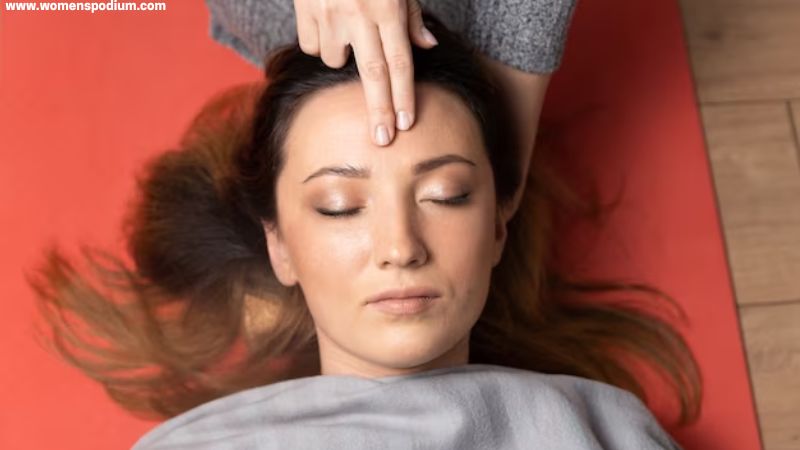
Mind-body techniques, such as yoga, deep breathing exercises, meditation, and mindfulness, can be valuable for managing menopausal symptoms. They promote relaxation, reduce stress and anxiety and improve overall well-being, which can relieve hot flashes, mood swings, and sleep troubles. Acupuncture, an alternative therapy that involves inserting thin needles into specific points on the body, may also offer relief by stimulating particular points to regulate hormonal imbalances and ease symptoms. Combining these approaches with a healthy lifestyle can empower women to navigate the challenges of menopause with greater comfort and balance. Consultation with a healthcare provider is advisable to determine the most suitable options for your needs.
6. Dietary Supplements

Dietary supplements, including vitamins and minerals, offer valuable support during menopause. Key nutrients like calcium and vitamin D are crucial for maintaining strong bones and reducing the risk of osteoporosis, a common concern for menopausal women. Adequate calcium and vitamin D intake also aids in reducing muscle cramps and maintaining overall well-being. Other supplements like magnesium can help alleviate muscle cramps and promote general well-being. These supplements should be taken as part of a balanced diet. Still, it’s vital to consult a healthcare professional for personalized advice and dosages based on individual needs and medical history.
7. Herbal Remedies
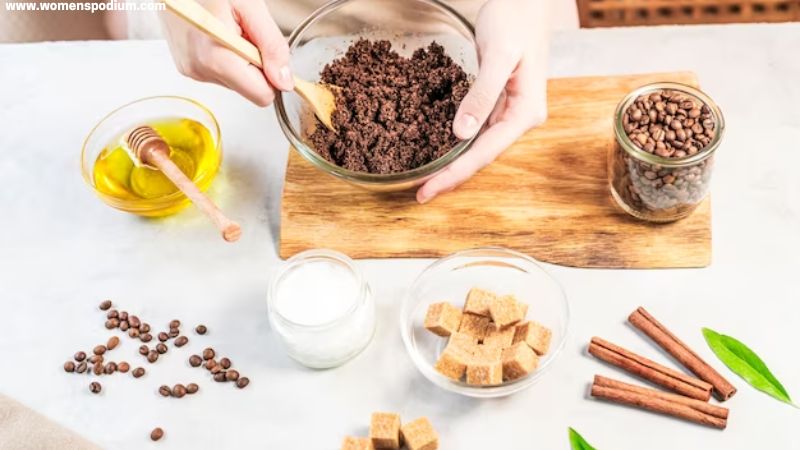
Herbal remedies can also aid in managing menopausal symptoms. Calcium and vitamin D supplements improve bone health, while omega-3 fatty acids found in fish oil supplements may help reduce mood swings. Some herbal supplements, such as red clover, black cohosh, and soy isoflavones, have been known for their potential to soothe menopause symptoms. Black cohosh and red clover are herbal options that may alleviate hot flashes and night sweats. Additionally, soy and flaxseed contain phytoestrogens that can help regulate hormonal fluctuations. However, it’s crucial to consult with a healthcare provider or physician before taking supplements or herbal remedies to ensure they are safe and appropriate for your needs, considering possible side effects.
Alternative Approaches to Managing Menopause
Besides the above shared 7 natural treatments for menopause, explore some alternative approaches to manage menopause. From holistic therapies to dietary adjustments and mindfulness practices, discover effective, realistic strategies for alleviating symptoms and improving overall well-being during this significant life transition. Take control of your menopausal journey with these empowering alternatives.
1. Hormone Replacement Therapy (HRT)

While not a natural remedy, Hormone Replacement Therapy (HRT) is a medical approach to managing menopausal symptoms. HRT involves taking medications that contain hormones (estrogen and/or progesterone) to replace those declining during menopause. HRT comes in various forms, such as creams, pills, patches, or vaginal rings. Despite being effective, HRT has associated risks, including an increased risk of stroke, blood clots, breast cancer, and heart disease; one must weigh it against its benefits. It can effectively relieve many menopause symptoms but should be discussed with a healthcare provider, as it carries potential risks and benefits that vary for each individual.
2. Lifestyle Modifications

Lifestyle modifications are essential during menopause. Regular exercise, including both resistance training and aerobic, helps maintain weight and bone density while reducing hot flashes. Opting for a balanced diet rich in fruits, vegetables, whole grains and calcium and omega-3 supplements supports overall health. Managing stress through relaxation techniques like yoga or meditation improves emotional well-being. Prioritizing sleep hygiene and maintaining a consistent sleep schedule aids in better rest. Limiting alcohol and quitting smoking contributes to better heart and bone health. These lifestyle changes promote a smoother transition through menopause and enhance overall quality of life.
3. Regular Check-ups

Regular check-ups during menopause are important for several reasons. Ensure to visit your doctor regularly for check-ups to discuss any health concerns. Don’t start any supplements without your doctor’s consultation. It’s essential to consult with your physician before starting any supplement or new treatment, especially if you are already on some medications or have underlying health conditions. They can provide personal guidance and help you make instructed decisions about managing your menopause symptoms in a way that fits your needs and preferences. Also, they can monitor your progress and adjust your treatment plan as necessary.
4. Counselling or Support Groups

Talking to a therapist or joining a support group can provide emotional support and strategies for coping with the psychological aspects of menopause. Seek support from friends, family, or a healthcare professional to help you stay motivated and accountable.
Final Advice
It’s important to understand that not all women experience all the menopause symptoms, and the severity and duration of symptoms can vary widely, depending on the person. Every woman’s experience with menopause is unique, and what works for one person may not work for another. Some women may experience menopause symptoms for a relatively short period, while others may endure for several years. If you are experiencing significant pain or distress due to menopause symptoms, it’s advisable to consult with a healthcare provider for guidance and potential treatment options to manage these symptoms effectively. Hope the above shared 7 natural treatments for menopause that really work will work for you as well.
Also Read: Yoga is a trending weight loss solution with no known side effects. Is yoga truly effective for weight loss as people claim?





